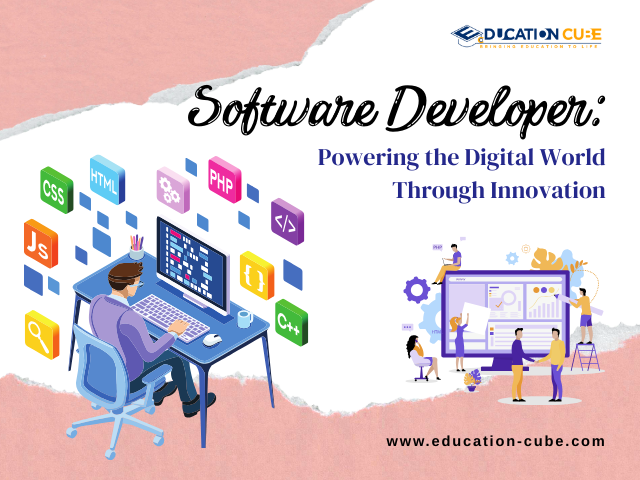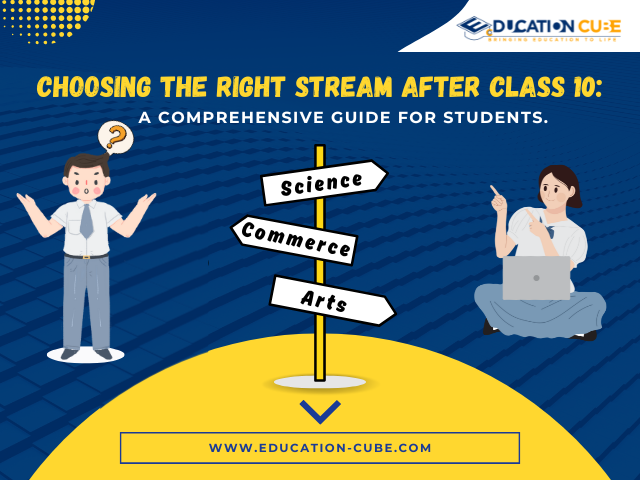
Software Developer: Powering the Digital World Through Innovation
The world’s digital operations run on the code built by software developers. From mobile apps and banking platforms to AI-driven innovations, they are the creative force behind every advancement. Software development is more than a career—it’s about making a global impact, learning continuously, and driving transformation across industries. With Education-Cube, students gain access to world-class software development programs, empowering them to build successful international careers in today’s digital-first world.
Why Study Software Development Abroad?
Choosing to study software development overseas opens countless doors:
- World-Class Curriculum: Leading universities and institutes deliver up-to-date knowledge, cutting-edge technologies, and industry best practices.
- Practical Training: International programs emphasize hands-on projects, internships, and exposure to real-world industry scenarios.
- Global Recognition: Degrees from top-ranked global institutions are highly valued by employers worldwide—boosting your international career prospects.
- Cultural Experience: Living and learning in a new country fosters global networks and broadens perspectives, which are essential for today’s collaborative tech landscape.
- Career Growth: Many countries offer attractive post-study work visas and pathways to permanent residency for skilled software professionals
Clear Pathways to Exciting Careers
Choosing software development means stepping into an ecosystem complete with opportunity:
- Skill Versatility: Developers can specialize in various fields, including web, mobile, AI, gaming, fintech, cybersecurity, and more. The field adapts as technology evolves, ensuring your skills always remain relevant.
- Unmatched Demand: With the rise of cloud computing, data science, and automation, the need for talented developers has never been higher.
- Global Mobility: A software developer’s skills are universally valued, opening doors in tech hubs like Silicon Valley, London, Berlin, Bangalore, Sydney, and beyond.
- Empowerment & Creativity: Developers create digital tools that solve personal and social challenges, making their work directly impactful and widely appreciated.
Essential Tools and Skills for Success
To truly shine in this field, you’ll build proficiency with:
- Programming Languages: Start with Python or JavaScript, then expand to Java, C#, C++, Ruby, and Swift.
- Frameworks & Platforms: Learn React, Angular, Node.js, .NET, Django, Flutter.
- Cloud Platforms: AWS, Azure, Google Cloud—build scalable, resilient systems.
- Database Technologies: SQL, PostgreSQL, MongoDB—organize and leverage massive datasets.
- Emerging Technologies: Explore AI, machine learning, and blockchain basics
- Teamwork & Communication: Collaborate seamlessly in diverse, often remote, project teams.
Choose your Education Path
Studying software development offers many paths:
- Traditional Degrees: Bachelor’s or Master’s in Computer Science, Software Engineering, or IT from top global universities.
- Coding Bootcamps: Fast-track skills training for immediate industry entry.
- Certifications: Specialized learning in cloud, AI, cybersecurity, and more.
- Online Learning: Flexible programs for all experience levels.
Top Destinations and Universities for Software Development
- USA: MIT, Stanford University, Carnegie Mellon
- UK: University of Oxford, University College London
- Canada: University of Toronto, UBC, McGill University
- Ireland: Trinity College Dublin, University College Cork
- Germany: Technical University of Munich, RWTH Aachen
Many of these institutions offer specialized Bachelor’s, Master’s, and research programs in Software Engineering, Computer Science, and related fields.
Admission Requirements
- Academic transcripts (10th, 12th, and/or Bachelor’s degree)
- English proficiency scores—IELTS, TOEFL, PTE, Duolingo(as required by destination country)
- Statement of Purpose (SOP), Letters of Recommendation, and CV
- Entrance exams (such as SAT, GRE, or university-specific tests if required)
- Valid passport and essential visa documents
Education-Cube supports you throughout the documentation, application, and interview process to ensure a seamless admission journey.
Scholarships and Funding Opportunities
Tuition ranges widely by country and university; scholarships from governments and institutions are available. Popular scholarships include Erasmus+, DAAD, and various university merit awards. Begin your scholarship applications early to increase your chances.
Post-Study Work Opportunities
Most top study destinations provide international graduates with the chance to gain valuable work experience:
- USA: OPT & STEM extension for up to 3 years
- Canada: Up to 3-year Post-Graduation Work Permit (PGWP)
- UK: 2-year Graduate Route post-study work visa
- Australia: Up to 4 years based on degree/region
- Germany: 18-month job-seeker visa post-graduation
- Ireland: Up to a 2-year stay-back option
These pathways can also accelerate eligibility for permanent residency, especially for skilled software professionals.
Real Career Outcomes: What Can You Become?
- Full-Stack Developer: Design everything from user interfaces (frontend) to servers and databases (backend).
- Mobile App Developer: Create breakthrough apps for Apple and Android platforms.
- AI/ML Engineer: Drive cutting-edge artificial intelligence advances.
- Game Developer: Build immersive entertainment experiences for millions.
- Cybersecurity Engineer: Protect digital assets from evolving threats.
- Cloud Architect: Design next-generation infrastructure for scalable solutions.
Financial Rewards and Job Security
Software developers command impressive salaries, with entry-level positions far exceeding averages in other sectors and senior roles offering substantial six-figure packages. Positions often come with bonuses, stock options, health benefits, and the flexibility of remote work.
The Future: 2025 and Beyond
Software development is constantly evolving. Expect growth in areas such as:
- AI-driven Software: Smarter, adaptive systems.
- Augmented Reality & IoT: Next-generation user experiences.
- Low-code/No-code Platforms: Accelerate Digital Transformation for Businesses and Non-Technical Users.
- Green Tech: Sustainable, energy-efficient coding practices.
Staying adaptable and curious will set you apart—developers are lifelong learners, always ahead of the curve.
Conclusion: Your Gateway to Digital Influence
Software development is more than just coding—it’s about solving real-world challenges and shaping the future. Every day, developers create solutions that impact millions, driving innovation across industries. This dynamic field offers intellectual growth, creative fulfillment, financial stability, and access to a wide range of global opportunities. If you are passionate about technology and innovation, there’s no better time to begin. Power your future—start your journey in software development today.
FAQs
1. What does a software developer actually do?
A software developer designs, builds, tests, and maintains digital solutions across industries. Their work spans from creating mobile apps and web platforms to developing AI-driven applications that transform the way people interact with technology.
2. Can I become a software developer without an engineering degree?
Yes. Many developers succeed through self-learning, coding bootcamps, and industry certifications. Practical skills and project experience often outweigh formal degrees in this fast-evolving field.
3. How quickly can I find a software development job after starting to learn?
With focused learning, internships, and hands-on projects, many candidates secure roles within a few months, particularly in high-demand areas such as AI, cloud computing, and web development.
4. What are the best countries to study software development abroad?
The USA, Canada, UK, Germany, Australia, and Ireland stand out for their quality curricula, integration with the tech industry, and post-study work pathways for international graduates.
5. What skills should I focus on to become a successful software developer?
Key skills include proficiency in programming languages such as Python, JavaScript, and Java; an understanding of frameworks like React and Node.js; experience with cloud computing platforms like AWS; and strong collaboration and problem-solving abilities.
6. Can international students work while studying software development abroad?
Yes, most countries allow part-time work during studies and offer post-study work visas, enabling students to gain valuable professional experience.
7. Are scholarships available for software development courses?
Many universities and governments offer merit- and need-based scholarships, such as Erasmus+ and DAAD scholarships, as well as institutional awards, to support international students in software development programs.
 Global Pharmacy Programs: Elevate Your Career with World-Class Education and Practical Exposure
Global Pharmacy Programs: Elevate Your Career with World-Class Education and Practical Exposure
 Artificial Intelligence (AI) and Machine Learning (ML) Careers: Building the Future of Innovation
Artificial Intelligence (AI) and Machine Learning (ML) Careers: Building the Future of Innovation
 Beyond Rankings: How to Choose the Right Country and University for Higher Studies
Beyond Rankings: How to Choose the Right Country and University for Higher Studies
 Study Cloud Computing Abroad: Destinations, Courses, Careers & Trends for 2025
Study Cloud Computing Abroad: Destinations, Courses, Careers & Trends for 2025
 Choosing the Right Stream After Class 10: A Comprehensive Guide for Students
Choosing the Right Stream After Class 10: A Comprehensive Guide for Students
 IELTS Exam Guide 2025: Expert Tips, Preparation Strategies & Best Practices for International Students
IELTS Exam Guide 2025: Expert Tips, Preparation Strategies & Best Practices for International Students
 A Comprehensive Guide to Writing a Letter of Intent for Higher Education
A Comprehensive Guide to Writing a Letter of Intent for Higher Education
 Study in France: A Comprehensive Guide for International Students
Study in France: A Comprehensive Guide for International Students
 International Relations & Political Science: Studying Global Affairs Abroad
International Relations & Political Science: Studying Global Affairs Abroad
00 Comments
Leave a Comment